I've always liked trains. For tourists cast adrift in a foreign land, they have the big advantage, over buses, of going to stations that have name plaques. Provided you know the name of the place you're going then it's just a case of being able to read. Of course this is long before trains, trams and buses began to speak or you could GPS track your position.
Now Spain isn't bad at signing things but it isn't good either. Signs are apt to be missing when you most need them. Sometimes they are there but not obvious. They lurk. Not big enough. Not in your eyeline. Not right somehow. Once you get the hang of it they are more noticeable but that's when you don't need them. When you're in a hurry, flustered, weighed down by kilos of baggage etc., they never seem to be there.
So, I'm in Madrid, I decide to go to el Escorial for the day. I get off the train. The few people who get off at the same halt go both left and right at the station entrance. I have no idea which way it is to town. I chose badly. It was the same in Almeria and in countless other places. I sometimes walked miles in the wrong direction dragging my luggage (some genius had still to put wheels on suitcases) before finally getting somewhere central.
Monóvar is a town about 15 minutes drive from Pinoso.You pass through it going from our house to the motorway. When we first moved here we passed what was obviously a railway station with a board outside that read Monóvar-Pinoso. We presumed it was a rail line between the two towns. We asked around and were told there was no longer a railway line to Pinoso but that the station was still in use and that it was possible to catch a train from there to far away Bilbao in the Basque Country. It wasn't true. It was just the sort of dodgy information that we Britons provide to other Britons. It was simply the old, long closed, railway station in the town of Monóvar which had also served Pinoso in the forgotten past. In the same way that PG Wodehouse always used to have Lord Emsworth send someone from Blandings Castle to meet the train in Market Blandings there must have been taxis or carters moving people and goods between Pinoso and Monóvar.
Right then, after five or so paragraphs of round the houses, my point is that Spain has a habit of putting its train stations a fair way from the town centre and without any signs for luggage hauling pedestrians. Not always I should add. Alicante and Murcia, Madrid and Valencia, for example, all have central railway stations
Spain has had high speed trains for ages. After I'd been to the Expo in Seville in 1992 I caught the high speed train, the AVE, to Cordoba just to have a go. I was given a glass of sherry and a newspaper as I boarded by a young uniformed woman who I suspect had been chosen for reasons that would not now be acceptable. When the line from Albacete to Madrid opened at Christmas in 2010 we drove the 90 minutes to Albacete to catch the AVE to Cuenca just for the experience or 300km/h travel. As we arrived there were people on the approaches to the station to watch the train arrive. They were there because it was still novel. Mind you there's not much to do in Cuenca on a Sunday. The AVE station in Cuenca is miles from the town centre. The bus that joins the old Main Square to the station takes 24 minutes to complete its route.
It was the same when the line was extended from Madrid to Alicante. We were there to try it out. Our nearest AVE station is in Villena; the most underused station on the whole of the AVE network. When the route for the line was being decided one of the possibilities was that it would follow the traditional tracks which run right through the middle of Villena. The locals weren't for that. They wanted the lines to run underground so that they didn't have to wait at level crossing time after time. So Adif, the people who own the lines and stations and so on, saved themselves a shedload of cash and hassle by running the line through open country close to Villena. Now it takes about a quarter of an hour to drive to the station from the middle of Villena. I bet they wish the unused land option was open them in Murcia. In Murcia city there have been pitched battles between locals, opposed to the route chosen, and the police. The tracks are set to run through an economically challenged neighbourhood on the approach to the city.
Anyway. Only a couple of weeks ago the extension of the line from Alicante to Elche to Orihuela. that will finally continue to Murcia, was opened. I had to go to Elche yesterday because there was some recall on the software on my car (cars used to be recalled for problems with the brakes or fuel lines or some such but now it's software) so I thought I'd have a look at the new AVE station when I was there. Google maps got me there. The station is down a twisty track in a field in one of Elche's pedanias, called Matola. It's 8 kilometres from the town centre and the signs were few and far between, a bit like putting the bus station for Pinoso in Culebrón.


























